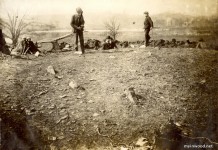
In March of 1888 New York City was slammed by one of the most devastating blizzards in recorded history. From March 11th to 15th the city was buried underneath fifty inches of snow.
The Great White Hurricane, as it came to be known, disabled transportation and telegraph communication from the Chesapeake Bay to Montreal. Huge, “modern” cites suddenly found themselves cut off from the rest of the world.
For the first time in history the New York Stock Exchange closed–and would remain so for two days as the storm raged on.
In New York City alone more than 200 perished in the extreme cold. In the icy darkness of night fires raged as helpless volunteers watched from afar, their rescue teams trapped in the deep drifts that formed in the howling winds.

With surface transportation crippled many credit the Blizzard of 1888, or “The Blizzard,” as it was known for fifty years hence, with the creation of New York’s underground subway system.
The below report, filed in the New York Herald, just as the storm abated, describes both the horrors and bravery experienced by everyday New Yorker’s as they weathered one of the worst storms in U.S. history.

New York Herald
March 14, 1888
With men and women dying in her ghostly streets, New York saw day breaking through the wild clouds yesterday morning. Nature had overwhelmed the metropolis, and citizens were found dead in the mighty snowdrifts. White, frozen hands sticking up out of the billowed and furrowed wastes testified to the unspeakable power that had desolated the city.
Had Jules Verne written such a story a week ago New Yorkers would have laughed and pronounced it a clever but impossible romance.
Yet here was the stupendous reality. Within forty-eight hours the city was converted into an Arctic wilderness, cut off from all railway and telegraph communication. The white hurricane had strewn her busiest and gayest thoroughfares with wreck and ruin. Courts of justice were closed and the vast machinery of commerce Europe could not was paralyzed. Groans of mutilated humanity filled the air.
The artillery of all Europe could not have reduced New York to such an awful condition of helplessness in such short time. Think of reporters on snowshoes, and rescuing parties being organized to save men from dying of exposure in the heart of the city! When firemen dragged their engines to fires it looked as if they were soldiers hurrying cannon through the wilderness as they sat on their horses lashing the leaders and following the dim figures of mounted scouts in the mad tempest.
It was all so white, strange, picturesque and grandly terrible as the ugly sky frowned upon the pulseless, haggard miles of half-buried houses. Everybody knew that corpses would be dug out of the streets.
BELOW ZERO
Just after dawn yesterday the snow ceased to fall, but the great wind that had roared ceaselessly for two days and two nights still shook the earth and whirled flakes upward again in weird, fantastic shapes. At six o’clock the thermometer was one degree below zero.

Thousands upon thousands of men, wrapped in the oddest of costumes that imagination can picture, turned out to dig paths through the streets. In many places the diggers had to cut through gigantic drifts in order to release people who were imprisoned in their own houses.
Tremendous hills of snow were thrown up in the streets, and between them were paths through which the population crept along. Sometimes these hills were so high that a man would walk for half a block without being able to see anything but the sullen sky above him. Horses were employed in dragging away the fallen trees and telegraph poles. Thousands of abandoned wagons were dug out and dragged by double teams to places of shelter.
But with all the confusing sights and sounds that turned New York upside down and made people wonder if it was not all a dream the most appalling thing was the absolute breaking off of all outside communication. The elevated railway trains had partially resumed work, and citizens could go up and down town again without danger of freezing to death in the streets, but no one could get in or out of the city. The great trunk lines were buried. Now and then some pale and half dead wanderer struggled into the mountainous outskirts and told dreadful stories of whole trainloads of passengers imprisoned in the snow, without food of the slightest means of escape.

Rescue parties in sleighs were sent out in all directions to relieve the snowbound unfortunates. The railway companies battled heroically with the snow in their efforts to push through their trains. Here and there engines were chained together and hurled against the drifts at full speed. The New York Central Company upset one of the heaviest locomotives while trying to butt a hole through the snow packed in the Fourth Avenue tunnel. How many have died in the drifts while trying to reach help from these blocked trains will not be known for days yet.
LOCKED IN SLEEPING CARS
All the sleeping cars in the public railway depots were given to the public as hotels. Women and children lay on the hard floors and thankfully ate cheese and crackers distributed by railway officials.

The telegraph wires were simply raveled up into tangled webs that caught the feet of horses and human beings in the snow. Editors cabled to London in hopes of getting news from Boston. The operators slept all night beside their instruments, but no sound broke the deadly silence.
All wheel traffic ceased in the city with very few exceptions. The jingle of sleigh bells was heard from the Battery to Harlem. Russian droskies plunged down Wall Street, where a few brokers gathered in the almost abandoned Stock Exchange. It looked like a winter scene in St. Petersburg. When a wheeled vehicle appeared it was dragged by teams proceeded by extra horses, upon which rude postilious were mounted. Sleighs were hired out for $50 and $30 a day.
Most extraordinary looking structures on runners began to appear in the most fashionable parts of the city. Rich club men were glad to drive down town from their clubs in ramshackle grocery sleighs of last century pattern. The Insurance Fire Patrol dashed to fires in sleighs. Carpenters were kept busy making rough sleds of unpainted lumber for the use of storekeepers. Mouldy arks on runners drew up in front of the Fifth Avenue Hotel, the Hoffman House and the other prominent hotels, and howling swells were glad to get a ride at any price.
BUT NO HORSE CARS
But not a horse car moved. Hour after hour the armies of diggers toiled and mile after mile of shining tracks were uncovered, but darkness came on again before a single car moved.
The sufferings of homeless people can hardly be told in words. All policemen were ordered to look out for these people, and also to arrest all persons who showed any signs of not being to take care of themselves. Early in the day the police lodging rooms were packed. Men who had money but could get no places to sleep in hotels applied at the station houses for shelter. The police were finally obliged to use their corridors to save men and women from perishing outside.

As the storm increased in fury on Monday night and the mercury fell lower and lower the cheap lodging houses on the Bowery were invaded by people who had been unable to get beds in the regular hotels. It was indescribably funny to see gorgeously attired young men of fashion humbly arranging for cots in the haunts of the tramp and street Arab. All night the lodging house dormitories were crowded with snow bound dandies who scratched and grumbled and tossed about on the hard pallets in the ill smelling cubbyholes. And wonderfully comical scenes took place at the breakfast tables, where waiters were paralyzed with astonishment at demands for napkins and finger bowls. Many of the ten-cent lodging houses raised their price for a cot to fifty cents.
Editors and reporters slept on chairs and billiard tables in the Press Club. The Exchange Club on New Street was filled all night with belated merchants, who sang, played poker, told blizzard stories or snored in their chairs in all sorts of odd postures. The uptown clubs were also turned into hotels, and sounds of revelry were heard from those who could not sleep on chairs and were not disposed to let any one else sleep. Some of the most prominent men in New York did not dare leave their clubs, and the story of the great storm of 1888 will long be famous in the cafes.
OFFENDERS AGAINST THE STATE
In front of all the clubs, in fact everywhere throughout the city, people could be seen feeding the starving sparrows, which flew against the windows in the most pitiful way. This awful violation of the law—for it is at present a criminal offense in New York—was ignored by the police. Nay, a Herald reporter saw a policeman in cold blood criminally feeding breadcrumbs to a sparrow in Twenty-third Street near Ninth Avenue.

All through the wild night and far into the morning, with its horror of flying fragments and gleaming white mountains, the police were at work saving exhausted pedestrians from death in the snow. One well-known merchant at daybreak was found dead on Seventh Avenue. Another man’s rigid corpse was picked up in Central Park. An unfortunate woman was frozen to death in a hallway. Men were picked up senseless in all directions.
Two Herald reporters were fighting their way through the furious storm yesterday morning at three o’clock. They had waded through drift after drift and were covered with snow from head to foot. One of them had been thrown down by the wind and painfully injured. When the reporters reached the corner of Broadway and Twenty-third Street they saw a dark object half buried about three feet from the sidewalk. The snow was drifting over it. Struggling forward they reached the spot and found a policeman lying down insensible. He would have died in an hour had he not been discovered. The reporters raised the man up and half carried him into the Herald uptown office across the street, where he revived. He said that he had gradually become insensible and fell while trying to make his way to the Fifth Avenue Hotel.
There had been a universal carouse in the saloons all day. Men had filled themselves with whiskey in order to resist the effects of the cold. Drunken men reeled out of the rum shops and staggered into the deep snow. While daylight lasted these men were soon discovered and rescued. But when darkness closed in and the storm raged over a city plunged in utter blackness the police began to realize the frightful responsibility thrown upon them of saving human life.
IN UTTER DARKNESS
All the electric lamps were out and no attempt to light the gas lamps was made. Drunken men and men who were simply tired by long and severe struggles in the drifts were stumbled over in every neighborhood. The ambulances were overturned again and again, although some of them had extra horses attached by ropes to the shafts. A ghastly procession of wounded men and women began to file into the wards of the hospitals. Broken skulls, fractured arms, thighs and legs, frozen hands and feet—these were the things that kept the whole corps of every hospital up all night. Men were found bareheaded and insane in the tempest.

A heartrending wail began to go up all over the great city. People were missed and no trace could be found of them. Husbands, fathers, wives, mothers, sons and daughters poured into the police stations haggard, hollow eyed and desperate with fear and anxiety. The Morgue will soon be choked with victims.
Then came the news that none of the Sound steamers had been heard from. It was known that the ocean was beating in with terrific force and many vessels were given up as lost. Crowds of half crazed people haunted the offices of the different lines in the vain search for information.
This was also a feature at the railway depots, where anxious people learned that their relatives might be cooped up in any one of the seventy-five trains snowed in with all their passengers within fifty miles of New York. Some of those who found their way in from the trains stayed in the depots giving information. One train on the Harlem Road started from Pleasantville for the city at twenty minutes past seven o’clock on Monday morning. It was due here at half-past eight o’clock. The train did not reach New York at all. After plunging and thrusting all day in the snow it was left at Melrose at night. Many of the passengers started on foot for the city. Many others stayed behind. Among them were a number of ladies. The railway officials sent food to the prisoners. It was greedily taken by the men, who acted in the most selfish manner. Finally all hands walked from the train to the city, singing and shouting and playing games on the roads.
BROOKLYN’S ISOLATION
Brooklyn was in a frightful plight, being completely cut off from New York. There was an effort made to run cars on the big Bridge, but one train was derailed on the west side, and further work in that direction was given up. To walk across the bare and unsheltered promenade in the storm that shrieked through the ponderous steel rigging meant suffering and perhaps death. The police advised women not to try it.

Here nature, which had shut off the ordinary channels of travel and rendered the monumental bridge of the century useless, provided a substitute in the shape of an ice bridge just like the crystal floe across which Henry Ward Beecher and a few thousand of his fellow citizens walked from shore to shore on the famous cold day in 1874.
A great floe of jumbled ice drifted out of the North River (Hudson) and swung around the Battery into the East River at about half-past seven o’clock yesterday morning. It was a very extensive field of ice, and as it slowly moved toward the bridge on the sluggish tide its edges ground with a loud noise against the piers on the Brooklyn side. The floe at last glued itself against the shore at Martin’s stores. It gathered up floating ice in its glittering skirts till the East River was filled from one side to the other. A few bold men climbed down on the Brooklyn side and cautiously treaded the dangerous field toward the metropolis. Every little wave underneath made the floe bend and undulate and flash. Crowds of half frozen spectators on the shore shouted warnings to the intrepid pioneers.
But no matter how the ice reeled or rocked or creaked with ominous sounds, on went a little line of men Indian file, picking their way like ballet girls over the heaving pathway. Policemen on the Bridge climbed up on the granite copings to look at the thrilling sight. Sailors scrambled up the ice wreathed rigging of their spectral ships and hallooed wildly as the line came marching on.
CUT IN TWAIN
Suddenly the steam tug Transfer sped trough the middle of the floe, throwing up soft and rotten ice over her prow.
Initially there was a general cry of terror, and the excursionists ran back to Brooklyn, falling again and again in their mad scramble for safety. Later on the river was bridged again. This time there was a solid crossing. Several hundred men and boys walked over to New York. Among them were John Price, night clerk of the International Hotel, and his companion, John Fitzgerald. A big Newfoundland dog was also seen following his master over the strange bridge. Thousands of people gathered on the riverfront, despite the fierce weather, to look at the remarkable spectacle. Soon the heartless greed for money which has been so prominently shown during the last two days was developed. The only way a man could get down on the ice from the Brooklyn docks was by using ladders. The men who owned the ladders charged three cents for each person. This idea was at once taken up on the New York side, where the ladder men charged five cents for the privilege of climbing up off the ice floe. This fee was insisted upon even when some of the victims were in danger of drowning.
The tide changed some time after ten o’clock and the floe broke up. Then ensued a scene of extraordinary excitement, as a number of men were carried down the river on cakes of ice. The castaways shouted for help and waved their hands wildly over their heads. All the vessels in sight gave the alarm by blowing their whistles, and the crowds ran frantically along the riverfront on both sides screaming and shouting. Steam tugs hurried out from the slips and soon picked up all the involuntary sailors from their perilous footholds. It is rumored that two of the men were washed beyond Governor’s Island and drowned, but this is denied vigorously by many who stood on the Bridge and saw the whole scene.

Such scenes as these were the successors of the long night suspense which kept New York awake. The drug stores down town, for the first time in years, they had sold out their entire stock of playing cards during the night, showing how little sleep was indulged in by the excited inhabitants of the lower part of the city.
CAGED LEGISLATORS
So great was the blockade and so entirely was all travel suspended that fourteen out of the thirty-two member of the State Senate were locked up in the city— C. P. Vedder, John Raines, James F. Pierce, Eugene F, O’Connor, Jacob Worth, Michael C. Murphy, Ed F. Reilley, Julius Caesar Langbein, Cornelius Van Cott, G. Z. Erwin, Hadley, Coggeshall, Sweet and Hawkins. Thirty-nine Assemblymen were also kept in the city. None of these legislators had any means of learning what was going on in Albany or of instructing their associates on bills. Some of them fairly danced with anguish at the thought of what might be done while they were away from Albany. Senator Vedder, by the way, paid $25 for a ride from Union Square to the Chamber of Commerce, which will cause excitement when it becomes known in Cattaraugus County.
All the bold collar-button and suspender peddlers appeared on the streets with baskets and boxes filled with many colored toboggan caps and thick woolen gloves. These were sold by thousands and soon the profusion of this tinted headgear gave Broadway and the Bowery a gay, holiday look despite the weltering desolation that loomed up on all sides. Caps sold for fifteen cents each. They were hawked in all the hotel corridors.

No milk was served in New York yesterday. The cows had a rest. Newspapers sold at enormous prices. It was one of the striking features of the situation. The Herald sold for five cents a copy early in the morning; later on the price was raised to ten cents. It finally reached twenty-five cents. These prices were good-naturedly paid, partly through the anxiety of citizens to learn the extent of the great calamity and partly out of pity for the pinched and frozen newsboys.
Thousands of people ran out of coal, and the dealers took advantage of their necessities to extort double prices in many cases. Women could not venture out of doors till the streets were at least partly cleared. Men who had always scorned to take any notice of domestic details were compelled to humbly beg their grocers to send provisions. Many were only too glad to carry the parcels home. The groceries were rapidly exhausted of their stock. On the east side of the city this caused a great deal of serious suffering.
HEROES OF THE HOUR

There never was a city on the face of the earth in which more superb manhood has been shown than that which the now historic white hurricane developed. The police and the firemen deserve the highest praise for the endurance, unselfishness and heroism which they have shown. A great, tender, noble heart has the American metropolis exhibited. Everyone agreed yesterday that every charitable and benevolent organization within the reach of New York must open its doors wide now if ever it is to be done. The city had lost so many millions of dollars by this storm that no man will dare to even guess at the total damage. The bulk of this burden will fall upon the poor and naked.
Now is the time New York millionaires to show how royally Americans respond to the cry of distress! Now, while the streets are buried, while men and women are wandering half clothed and hungry over the storm smitten streets, dying and clutching helplessly at the empty air. Think it over.









That’s quite an amazing account of the devastation incurred in New York City during the blizzard. For years family legend had it that my Danish great-grandparents arrived in New York during The Blizzard of ’88. And through some research I’ve found the story was based on fact. My great grandparents, Soren and Georgine Pedersen and their two toddlers arrived aboard the Bohemia (out of Hamburg) on March 13, 1888. I can imagine their terror of not finding the streets lined with gold, but a frozen hell with 200 dead buried along New York’s streets.
Every time it snowed when I was growing up in north Jersey, my grandparents, who lived next door, reminded us of the Blizzard of ’88. My grandmother was a small child in YC at the time, but my grandfather didn’t arrive until ’90, so his accounts were less vivid. He routinely spoke about driving a horse drawn wagon across the Hudson in later stormy winters, however. And out here in the midwest, there are enough of us with roots back east to compare terrible winter storms with that blizzard, most notably, the blizzard which hit the midwest and the east as far as Buffalo and beyond, in 1978. A few inches short of the 1888 event. Great photos and drawings. It is good to know our history.
This must be what Mayor de Blasio had in mind.
I wonder how often the East River froze over – amazing that Rev H.W. Beecher makes an appearance leading his flock across the ice.
Wow! At least Boston residents now have cellphones